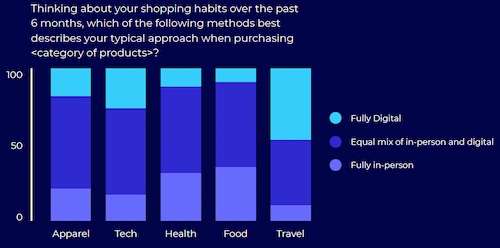 |
While digital channels may be in the driver’s seat in today’s marketplace, the need for human contact is still a key factor in determining consumer purchase decisions, according to a new study from customer engagement platform Khoros.
The survey of more than 1,300 consumers and marketing leaders found that two-thirds (67 percent) of respondents thought the best shopping experience is one that combines digital channels with human interaction.
In addition, more than half (57 percent) said that they want the option of talking to someone before buying a product or service.
The study measured consumer preferences across five categories (apparel, tech, health, food and travel), finding that travel consumers were the most likely to want a fully digital shopping experience. Shoppers for food and health-related products and services were the most likely to want their purchase journey to be fully in-person.
 |
But personalized shopping experiences don’t just depend on humans, Khoros notes. “Conversational commerce,” which the study says “can help brands create personalized, human connections with consumers,” can employ AI assistants as well as human representatives.
Marketers, however, seem not to have picked up on the power of conversational commerce. Only 12 percent of those surveyed said they consider conversational commerce to be a high priority when devising marketing strategies.
That could leave many of them behind in a rapidly changing consumer culture, the report says. To help them catch up, companies need to work at getting to know their customers “at a deeper level.”
It also stresses the importance of making sure that digital and in-person channels are combined in the kind of “fluid” manner that is being utilized by tech companies including Google, Apple and Meta.
One big way to tap into the human element, the report says, is through purpose-driven marketing—where getting to know customers is essential. “Brands’ products and advertising communicate their values and mission; but, if they don’t align with their consumers’ values, they can risk customer attrition.”
Khoros’s report was conducted by independent market research consultancy Illuminas between August and September of this year.


 Consumers who once demanded convenience now require consistent, multi-channel experiences that cater to them at every point. Brands must have a clear, audience-appropriate, and channel-specific voice across all platforms.
Consumers who once demanded convenience now require consistent, multi-channel experiences that cater to them at every point. Brands must have a clear, audience-appropriate, and channel-specific voice across all platforms. Employees at U.S. companies are experiencing high levels of burnout, but managers are lagging behind when it comes to their awareness of the problem
Employees at U.S. companies are experiencing high levels of burnout, but managers are lagging behind when it comes to their awareness of the problem Brand has a powerful effect on a company’s valuation, but the level of brand understanding in the investment community leaves a lot to be desired, according to a new study from Brodeur Partners, Interbrand and NewtonX.
Brand has a powerful effect on a company’s valuation, but the level of brand understanding in the investment community leaves a lot to be desired, according to a new study from Brodeur Partners, Interbrand and NewtonX. AI may still be viewed with a wary eye by most media pros, but its use is growing, according to a new study from Muck Rack.
AI may still be viewed with a wary eye by most media pros, but its use is growing, according to a new study from Muck Rack. A new study from Walker Sands says that some marketers have been putting the cart before the horse when it comes to the relationship between marketing channels and business outcomes.
A new study from Walker Sands says that some marketers have been putting the cart before the horse when it comes to the relationship between marketing channels and business outcomes.


 Have a comment? Send it to
Have a comment? Send it to 
Dec. 13, 2021, by Joe Honick
Fascinating in a pandemic that virtually demanded less human contact, the idea less would be desirable should never have been a question. Witness the massive outpouring of consumers for all sorts of venues once some vague signal of "normal" was put out. A trip to places of Costco, Sam's Club and other discount operations, including those with supply chain problems will quickly demonstrate the desirability of human contact. The digital business will always be there and expanding as well. Did we really need a survey?